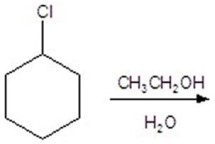Exam 22: Catalysis in Organic Reactions and in Enzymatic Reactions
Exam 1: Remembering General Chemistry: Electronic Structure and Bonding90 Questions
Exam 2: Acids and Bases: Central to Understanding Organic Chemistry43 Questions
Exam 3: An Introduction to Organic Compounds: Nomenclature, physical Properties, and Structure136 Questions
Exam 4: Isomers: the Arrangement of Atoms in Space125 Questions
Exam 5: Alkenes: Structure,nomenclature,and an Introduction to Reactivity - Thermodynamics and Kinetics84 Questions
Exam 6: The Reactions of Alkenes - the Stereochemistry of Addition Reactions89 Questions
Exam 7: The Reactions of Alkynes - Introduction to Multistep Synthesis124 Questions
Exam 8: Delocalized Electrons: Their Effect on Stability, pka, and the Products of a Reaction - Aromaticity and Electronic Effects: an Introduction to the Reactions of Benzene185 Questions
Exam 9: Substitution and Elimination Reactions of Alkyl Halides228 Questions
Exam 10: Reactions of Alcohols, ethers, epoxides, amines and Sulfur-Containing Compounds109 Questions
Exam 11: Organometallic Compounds65 Questions
Exam 12: Radicals141 Questions
Exam 13: Mass Spectrometry,infrared Spectroscopy,and Uvvis Spectroscopy140 Questions
Exam 14: Nmr Spectroscopy122 Questions
Exam 15: Reactions of Carboxylic Acids and Carboxylic Acid Derivatives126 Questions
Exam 16: Reactions of Aldehydes and Ketones122 Questions
Exam 17: Reactions at the Α-Carbon121 Questions
Exam 18: Reactions of Benzene and Substituted Benzenes168 Questions
Exam 19: More About Amines - Reactions of Heterocylic Compounds126 Questions
Exam 20: The Organic Chemistry of Carbohydrates110 Questions
Exam 21: Amino Acids,peptides,and Proteins117 Questions
Exam 22: Catalysis in Organic Reactions and in Enzymatic Reactions92 Questions
Exam 23: The Organic Chemistry of the Coenzymes, compounds Derived From Vitamins102 Questions
Exam 24: The Organic Chemistry of the Metabolic Pathways90 Questions
Exam 25: The Organic Chemistry of Lipids37 Questions
Exam 26: The Chemistry of the Nucleic Acids94 Questions
Exam 27: Synthetic Polymers116 Questions
Exam 28: Pericyclic Reactions102 Questions
Select questions type
Which of the following statements concerning general-acid catalysis is correct?
Free
(Multiple Choice)
4.9/5  (35)
(35)
Correct Answer:
D
Describe the acid-catalyzed second slow step in the hydrolysis of an ester.
Free
(Multiple Choice)
4.8/5  (25)
(25)
Correct Answer:
A
Which of the following statements about how acid catalyzes the hydrolysis of esters is correct?
(Multiple Choice)
4.9/5  (36)
(36)
Describe the second step of a specific-base-catalyzed dehydration of a hydrate.
(Multiple Choice)
4.9/5  (33)
(33)
In what kind of acid catalysis is the proton transferred completely to the reactant before a subsequent slow step?
(Short Answer)
4.9/5  (31)
(31)
Give the product(s)for the following reaction.You may choose more than one answer. 
(Multiple Choice)
4.8/5  (37)
(37)
List four common types of catalysts used in organic reactions and give one example of each.
(Essay)
4.8/5  (34)
(34)
What technique is used to gain information about protein structure and function by replacing single amino acids along a peptide chain?
(Short Answer)
4.9/5  (38)
(38)
Which of the following are affected when an intramolecular catalyst is used?
(Multiple Choice)
4.8/5  (41)
(41)
Describe the acid-catalyzed first slow step in the hydrolysis of an ester.
(Multiple Choice)
4.7/5  (35)
(35)
The reaction below occurs by a general-acid catalyzed mechanism.Use curved arrows to illustrate the ring-forming step of the mechanism. 
(Essay)
4.8/5  (27)
(27)
Predict the product of the following reaction involving general acid catalysis.
(Hint: Five membered ring is formed through intramolecular cyclization.) 
(Essay)
4.8/5  (37)
(37)
Which of the following is an intermediate in the mechanism of hydrolysis of the ester shown below? 
(Multiple Choice)
4.7/5  (37)
(37)
Which of the following is not true about the enzyme aldolase?
(Multiple Choice)
4.9/5  (31)
(31)
Showing 1 - 20 of 92
Filters
- Essay(0)
- Multiple Choice(0)
- Short Answer(0)
- True False(0)
- Matching(0)